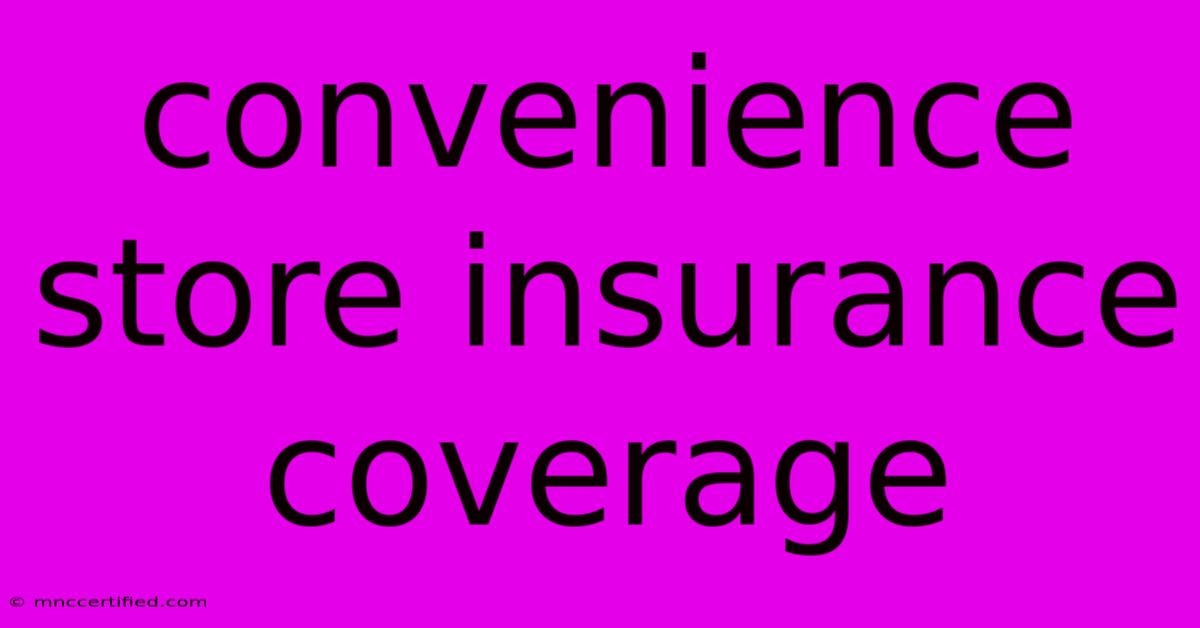Convenience Store Insurance Coverage

Table of Contents
Convenience Store Insurance Coverage: Protecting Your Business from Unexpected Events
Owning a convenience store is a demanding but rewarding endeavor. You're constantly on the go, catering to customers' needs 24/7 and ensuring your shelves are stocked with essentials. But amidst the hustle and bustle, it's crucial to remember that unforeseen events can strike at any moment. That's where convenience store insurance comes in, offering a safety net to protect your business and your financial wellbeing.
Understanding the Essentials of Convenience Store Insurance
Convenience store insurance isn't a one-size-fits-all solution. It encompasses various coverage options, each addressing specific risks you face. Here's a breakdown of key components:
1. Property Insurance: This is the cornerstone of your insurance policy, providing financial protection against damages to your physical assets. It covers losses from:
- Fire: A fire can devastate your inventory, fixtures, and even your entire store. Property insurance helps you rebuild and recover.
- Natural Disasters: Floods, earthquakes, and windstorms can cause significant damage. This coverage ensures you have the funds to repair or replace damaged property.
- Vandalism and Theft: Protection against malicious acts like vandalism or theft of valuable merchandise is crucial for convenience stores.
2. Business Interruption Insurance: This coverage safeguards your income if your business is forced to shut down due to an insured event. It covers lost revenue, continuing expenses, and other financial losses until operations resume.
3. Liability Insurance: This protects you against lawsuits stemming from accidents or injuries on your property. It can cover legal fees, medical expenses, and settlements.
4. Workers' Compensation Insurance: This is mandatory in most states and provides financial benefits to employees injured on the job. It covers medical expenses, lost wages, and rehabilitation costs.
5. Crime Insurance: This provides coverage for losses due to robbery, burglary, and employee dishonesty. It helps you recover from stolen cash, inventory, and even valuable equipment.
6. Liquor Liability Insurance: If you sell alcohol, this coverage protects you from lawsuits related to intoxicated customers causing harm to themselves or others.
Why Convenience Store Insurance is Crucial
Investing in the right insurance coverage is essential for several reasons:
- Financial Protection: It safeguards your business from crippling financial losses caused by unforeseen events.
- Peace of Mind: Knowing you have insurance in place can provide a sense of security and allow you to focus on running your business.
- Compliance: Some types of insurance, like workers' compensation, are legally required in certain states.
- Customer Confidence: Insurance demonstrates your commitment to safety and customer well-being, building trust with patrons.
Choosing the Right Coverage
Choosing the right insurance policy involves considering factors like:
- Your Location: Natural disaster risks vary depending on your region.
- Inventory Value: The type and value of your inventory will determine your coverage needs.
- Business Size: Larger stores may have higher insurance premiums due to increased risk.
- Your Budget: Find a balance between comprehensive coverage and affordability.
Pro Tip: Work with a reputable insurance broker to discuss your specific needs and receive personalized advice.
Optimizing Your Insurance for Success
- Regularly Review Your Policies: Your needs may change over time, so review and update your coverage periodically.
- Maintain Proper Security Measures: Implement security systems and procedures to reduce the risk of theft and vandalism.
- Educate Employees: Train your staff on safety procedures and how to handle emergencies.
- Document Everything: Keep accurate records of your inventory, sales, and business expenses.
By prioritizing convenience store insurance, you're taking a proactive step toward safeguarding your business and ensuring its long-term success. It's a wise investment that protects your financial well-being and allows you to focus on what you do best – serving your customers and building a thriving enterprise.

Thank you for visiting our website wich cover about Convenience Store Insurance Coverage. We hope the information provided has been useful to you. Feel free to contact us if you have any questions or need further assistance. See you next time and dont miss to bookmark.
Featured Posts
-
Massage Near Me That Takes Insurance
Nov 11, 2024
-
Bucks Fall To Celtics Giannis Posts 43 Points
Nov 11, 2024
-
Cardinals Roll Over Jets 31 6 Behind Murray
Nov 11, 2024
-
Mtv Ema Gossip Behind The Scenes
Nov 11, 2024
-
Nfl Week 10 Goffs 5 Ints Record Breaking Win
Nov 11, 2024